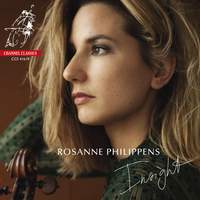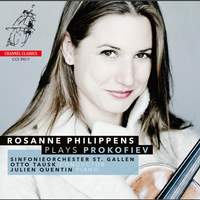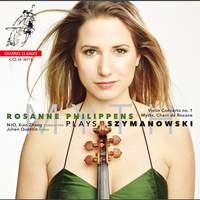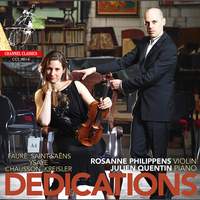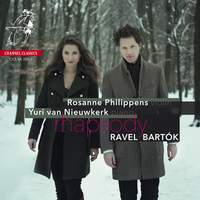Interview,
Rosanne Philippens on Insight
 Since making her debut on Channel Classics in 2013 with an album exploring the influence of folk music on Ravel and Bartók, the Netherlands-based violinist Rosanne Philippens has won widespread plaudits for her imaginative programming in the recording-studio, on the concert-platform, and through her Amsterdam Salon Pop Up project in which she presents short recitals in informal settings - complete with wine, a finger-buffet, and audience interaction. Her latest album, Insights, was created in response to audience feedback during a recent European tour, and includes unaccompanied works by Biber, Bach, Enescu and Ysaÿe, linked by Philippens’s own improvisations.
Since making her debut on Channel Classics in 2013 with an album exploring the influence of folk music on Ravel and Bartók, the Netherlands-based violinist Rosanne Philippens has won widespread plaudits for her imaginative programming in the recording-studio, on the concert-platform, and through her Amsterdam Salon Pop Up project in which she presents short recitals in informal settings - complete with wine, a finger-buffet, and audience interaction. Her latest album, Insights, was created in response to audience feedback during a recent European tour, and includes unaccompanied works by Biber, Bach, Enescu and Ysaÿe, linked by Philippens’s own improvisations.
Our friends at Channel Classics spoke to Rosanne about how the idea for this album was born, how the content and running-order evolved over the course of conversations with her audiences, and the connections between the four very different composers who feature on the programme.
Thinking up new programmes is something violinist Rosanne Philippens usually does by herself at a desk. But for this solo album she went about that quite differently...
I wanted to take up a new challenge to create a programme together with my audience - I had the feeling that this would provide me with new insight. With just my violin as travelling-companion, I set off through Europe for a series of solo recitals with a collection of pieces to try out, and after each concert I asked the audience for feedback. How had they experienced the programme: the atmosphere, the sequence of the pieces, and the length? Instead of treating my audience as passive listeners, I invited them to discuss these matters and feel involved, and on my way to the next recital I thought about the reactions. Slowly but surely the programme began to form a logical entity. So that is what Insight is all about.
Could you tell us in more detail what kind of insights these conversations with the audience gave you? What happened during the tour, and how did the programme change?
For example: the programme begins with Biber’s Passacaglia, a step-dance in triple time. I played it in a nightclub in Paris, walking among the audience to the rhythm of the basso continuo. The venue may look flashy – the club was designed by no-one less than David Lynch - but the acoustic is so dry that walking around the audience seemed a good way of bringing the sound closer to the people. After a while the Passacaglia perches on a note that sounds like a question-mark, and I decide to stop there and pick up the second half again at the end of the programme.
Also, after several concerts the Partita No. 3 in E major by Johann Sebastian Bach made way for the Partita No. 2 in D minor. I play the first four dances, the third of which is a Sarabande - which, like the Passacaglia, is a calm piece in triple time.
Two hundred years after Bach, the Romanian composer George Enescu also wrote a Sarabande; his very sparse sketches were written out in legible notes by the Romanian violinist Sherban Lupu. After playing some more recitals I wanted to put Enescu’s Sarabande on the programme, but it was difficult to find the right spot. Some people from the audience suggest I put it between the Bach movements, and so I discovered how very well the transition from Enescu’s closing major chord to Bach’s opening minor one works. So now Enescu’s dance is embraced between the dances by his great hero Bach. The Aires by Enescu alternate tranquil melodies with typical folk dances such as the hora, and the piece ends in revelry.
Bach, Biber, Enescu and Ysaÿe: most listeners will be familiar with their solo violin repertoire, but this is far from a default multi-composer solo violin recording...
The music was constantly in movement during the tour, because the programme was subject to continuous transformation. A central note in the programme seems to be the D - if this note is the sun, the other notes orbit around it like planets.
What came out is indeed an experimental programme! My aim was not just to record another interpretation of well-known pieces, but more to think about how the pieces relate to each other and which programme would actually work best in such a demanding setting as a solo violin recital. Also, in concert mode I would talk in-between the pieces, something that is not quite possible on a CD. Still, I wanted to bridge the gaps between the pieces, so I decided to make interludes or 'intermezzi'. These are improvisations that arose spontaneously during the recording sessions, and I have created a thread by using motifs from the pieces around them.
Insight was released on Channel Classics on 26th April.
Available Formats: CD, MP3, FLAC, Hi-Res FLAC, Hi-Res+ FLAC
Other recordings by Rosanne Philippens
Rosanne Philippens plays Prokofiev
Rosanne Philippens (violin), Julien Quentin (piano), Sinfonieorchester St. Gallen, Otto Tausk
'Philippens’s startling partnership with the excellent St Gallen Symphony Orchestra and Otto Tausk puts her Prokofiev Second Violin Concerto right at the top of the many recent recordings…[She] also turns in the most poetic and characterful performances of the late, D major Violin Sonata…and she’s limpidly partnered by pianist Julien Quentin.' (BBC Music Magazine)
Available Formats: CD, MP3, FLAC, Hi-Res FLAC, Hi-Res+ FLAC
'A significant talent whose varied tonal palette especially suits Szymanowski's music...Philippens connects well with Szymanowski's sensual muse.' (Gramophone)
Available Formats: MP3, FLAC, Hi-Res FLAC, Hi-Res+ FLAC
'Philippens’s brilliantly focused, expressive sound is coupled with an inspired programme of music by and for virtuoso violinists of the Romantic period. An absolute joy from start to finish.' (BBC Music Magazine)
Available Formats: CD, MP3, FLAC, Hi-Res FLAC, Hi-Res+ FLAC
'The cross-fertilisation certainly produces a pungent programme, played with terrific spirit...These two musicians work instinctively together, knowing just when to assert their pre-eminence and how to respond to one another's interpretative ideas.' (Gramophone)
Available Formats: SACD, MP3, FLAC, Hi-Res FLAC, Hi-Res+ FLAC


